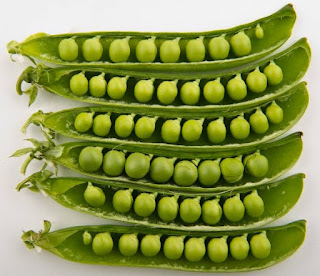Think again if you think peas are simple, everyday vegetables. When it comes to nutrients and health benefits, these tiny bead-sized jewels pack a powerful punch.
Peas belong to the legume family of foods. Legumes are plants that produce pods containing seeds or beans. Lentils, soybeans, chickpeas, and all types of beans are also members of the legume family.Nutrition :
Half Cup Of Peas Provides : (Approx 170Gm)
- Calories : 62
- Carbs : 11gm
- Fiber : 4gm
- Protein : 4gm
Vitamin & Minerals :
- Vitamin A
- Vitamin K
- Vitamin C
- Thiamine
- Folate
- Manganese
- Iron
- Phosphorus
Benefits :
Eyes Health :
Peas contain the carotenoids lutein and zeaxanthin, which are beneficial to the eyes. These nutrients aid in the prevention of chronic eye diseases such as cataracts and age-related macular degeneration. Lutein and zeaxanthin act as filters to protect the eyes from harmful blue light, which contributes to cataracts and macular degeneration.
Digestive Health :
Peas are high in coumestrol, a nutrient that helps prevent stomach cancer. A 2009 study in Mexico City found that eating peas and other legumes on a daily basis reduced the risk of stomach cancer by 50%. Peas are also high in fibre, which aids digestion by moving food through your gut.
Blood Sugar Management :
Peas are high in fibre and protein, which help to regulate how starches are digested. Peas' protein and fibre content help to control blood sugar levels by slowing carbohydrate breakdown. According to research, eating a high-protein diet lowers postprandial (after-meal) blood sugar in people with type 2 diabetes. Peas have a low glycemic index as well. This means you're less likely to experience sugar spikes after eating them.
Cardiovascular Health :
Plaque formation along blood vessel walls can be aided by inflammation and stress caused by free radicals (oxidation). Peas contain omega-3 and omega-6 fatty acids, which help to reduce oxidation and inflammation and prevent plaque formation. Furthermore, magnesium, potassium, and other minerals found in peas can reduce your risk of hypertension.
Iron-Rich :
Peas are an excellent source of iron. Iron deficiency is the most common cause of anaemia. If you don't get enough iron, your body won't be able to produce enough healthy oxygen-carrying red blood cells, resulting in haemoglobin deficiency. Iron combats fatigue and provides strength.
Increases Immunity :
Peas are high in vitamin C, making them one of the best foods for increasing immunity. "A single serving of peas or snow peas supplies half your daily needs," according to the book "Healing Foods." Peas, particularly pea shoots, contain phytoalexins, an antioxidant that can inhibit H. Pylori, the bacterium that causes stomach and duodenal ulcers, as well as stomach cancer.
Weight Loss :
The bite-sized peas can also help you shed some pounds quickly. Peas are low in fat and calories when compared to heavier legumes like beans and cowpeas. Peas have only 81 calories per 100 grammes. The high fibre content also contributes to weight loss. Fibre helps to induce a feeling of fullness, which prevents you from overindulging on other foods.
Good For Skin :
Peas are high in Vitamin C, which aids in the production of collagen. Collagen maintains the skin's firmness and radiance. Vitamin C also protects the cells from free radical damage. Antioxidants aid in the fight against oxidative damage caused by free radicals. It also contains antioxidants such as flavonoids, catechin, epicatechin, carotenoid, and alpha carotene, which help prevent signs of ageing.
Beneficial For Men's Health :
Peas can improve sperm count and motility. "Glycodelin- a substance found in snow peas- can help strengthen sperms and improve their ability to fertilise an egg," according to the book 'Healing Foods." Use them in soups, stews, gravies, and sandwiches, but don't skip out on the goodness of these lovely and healthy pods.






Comments